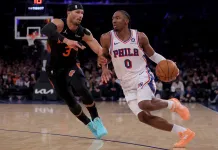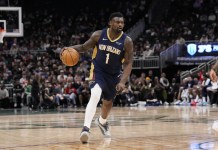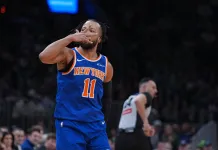The 2025-26 VSiN NBA Betting Guide was released on Tuesday, October 7. The 79-page publication features best bets from our talented VSiN hosts and analysts, betting strategy advice from Jonathan Von Tobel and Kelley Bydlon, and trends/insights from Steve Makinen. The guide also features team-by-team previews for all 30 NBA teams, including one on the Orlando Magic. Keep reading to see how we think the Magic will do compared to their regular season win total of 51.5.
Make sure you download the 2025-26 NBA Betting Guide for full access to our entire season preview!
Offense
It’s hard to put into words how bad Orlando’s offense has been lately, but this stat helps do the trick: the Magic haven’t had a top-20 offensive rating since 2011-12. That’s 13 straight seasons as one of the NBA’s 10 worst offenses.
Last year brought more of the same. Injuries didn’t help, but the Magic still finished 27th in adjusted offensive rating (109.1). They played at the slowest pace in the league (96.4) and shot a league-worst 31.8% from three — by a significant margin.
Jamahl Mosley has earned plenty of praise for steering the franchise back to relevance. From 22-60 in his first season to back-to-back playoff berths, he’s built a defensive identity and a winning culture. But offensively, his approach has lacked creativity. Now he’s under pressure to try to modernize the system.
The front office did Mosley a huge solid in the form of acquiring Desmond Bane. Orlando sent Kentavious Caldwell-Pope, Cole Anthony, and four first-round picks to Memphis to get him, and Bane immediately changes the calculus. He averaged 19.2 points, 6.1 rebounds, and 5.3 assists last season, and he’s a career 38.1% shooter from deep. He’s deadly off movement, comfortable off the dribble, and gives the Magic a dimension they’ve desperately lacked. With Bane, they should climb out of the basement in both attempts and accuracy from three.
He also brings underrated secondary playmaking. Between Bane, Franz Wagner, Paolo Banchero, and Jalen Suggs, Orlando has plenty of initiators.
Wagner and Banchero are the stars. Despite battling through shooting struggles, Wagner averaged a career-best 24.2 points along with 5.7 rebounds and 4.7 assists. His ability to get downhill and finish creatively makes him one of the league’s premier drivers. Banchero, meanwhile, has blossomed into one of basketball’s toughest covers. At 6’10” and 250 pounds, he averaged 25.9 points, 7.5 rebounds, and 4.8 assists, thriving as a bruising isolation scorer. If his jumper ticks up even slightly, he could enter the top-five conversation.
Suggs is the glue. He spaces the floor at high volume, organizes the offense, and gives the Magic another playmaker. Health is the question — he missed 47 games last season.
The Magic also made a sharp move by adding Tyus Jones, one of the steadiest point guards in the league. He’s a liability defensively, but he can run an offense and buy time if Suggs is sidelined. Between Jones and Anthony Black, the backcourt is better protected. Rookie Jase Richardson could also give them a spark.
Center is the biggest hole. Wendell Carter Jr. never developed the stretch element his game once promised. Moe Wagner is a higher-energy option with some pick-and-pop potential, but he’s coming off a torn ACL. That leaves Orlando without a reliable big.
Bane’s arrival addresses some of the shot-making issues, but Mosley still needs to overhaul his scheme. Playing faster, incorporating more off-ball action, and generating easier looks for Wagner and Banchero is non-negotiable if Orlando wants to take the next step.
Defense
Only Oklahoma City can definitively claim a better defense than Orlando. Despite extended absences from Suggs and Wagner, the Magic finished third in adjusted defensive rating (109.3) last season.
With Suggs, one of the NBA’s best guard defenders, and Wagner, an All-Defensive-caliber wing, healthy, Orlando should again field a top-five defense. Add in Black and Jonathan Isaac as disruptive reserves, and Mosley has elite defensive depth at his disposal.
The system also maximizes effort. Mosley simplifies responsibilities: funnel to the baseline, force into crowds, and live with fouls if needed. Orlando committed 21.4 fouls per game last year — third-most in the NBA — and viewed it as a fair trade for physicality and control of the paint.
The Magic’s most defining trait, though, is their three-point defense. They allowed the fewest made threes per game (11.4) in the league, and that commitment to running shooters off the line is central to their identity.
Outlook
The Magic started 17-9 last season, and 50 wins looked well within reach before injuries piled up. Banchero, Wagner, and Suggs missed a combined 105 games, and Orlando settled at 41-41.
The expectation is better injury luck, though with how physically this group plays, it’s reasonable to expect each star to miss some time — and Suggs is already going to get off to a slow start. Add in a period of experimentation with new lineups and concepts, and the regular-season win total becomes tricky.
This feels like a team you either pass on or lean Under with. That said, the playoff upside is real. Orlando’s ability to defend at an elite level, impose its physicality, and now space the floor more effectively makes them a legitimate threat to win the East.
If everything breaks right — health, Wagner’s yips going away, Banchero’s continued ascent, a sophomore leap from Tristan da Silva — Orlando could even sneak into the championship conversation.
Prediction: Under 51.5 Wins






